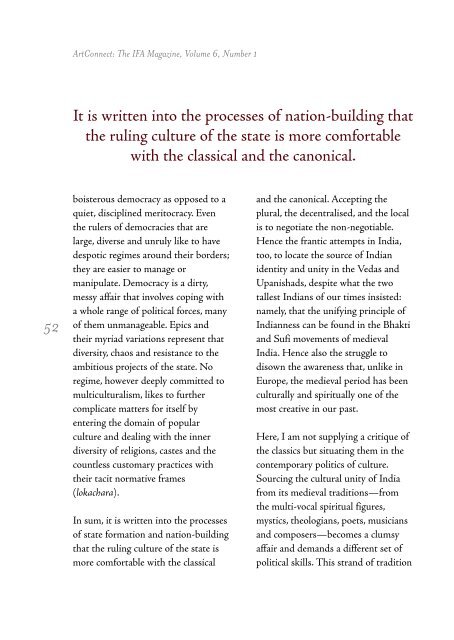Layout 3 - India Foundation for the Arts - IFA
Layout 3 - India Foundation for the Arts - IFA
Layout 3 - India Foundation for the Arts - IFA
You also want an ePaper? Increase the reach of your titles
YUMPU automatically turns print PDFs into web optimized ePapers that Google loves.
52<br />
ArtConnect: The <strong>IFA</strong> Magazine, Volume 6, Number 1<br />
It is written into <strong>the</strong> processes of nation-building that<br />
<strong>the</strong> ruling culture of <strong>the</strong> state is more com<strong>for</strong>table<br />
with <strong>the</strong> classical and <strong>the</strong> canonical.<br />
boisterous democracy as opposed to a<br />
quiet, disciplined meritocracy. Even<br />
<strong>the</strong> rulers of democracies that are<br />
large, diverse and unruly like to have<br />
despotic regimes around <strong>the</strong>ir borders;<br />
<strong>the</strong>y are easier to manage or<br />
manipulate. Democracy is a dirty,<br />
messy affair that involves coping with<br />
a whole range of political <strong>for</strong>ces, many<br />
of <strong>the</strong>m unmanageable. Epics and<br />
<strong>the</strong>ir myriad variations represent that<br />
diversity, chaos and resistance to <strong>the</strong><br />
ambitious projects of <strong>the</strong> state. No<br />
regime, however deeply committed to<br />
multiculturalism, likes to fur<strong>the</strong>r<br />
complicate matters <strong>for</strong> itself by<br />
entering <strong>the</strong> domain of popular<br />
culture and dealing with <strong>the</strong> inner<br />
diversity of religions, castes and <strong>the</strong><br />
countless customary practices with<br />
<strong>the</strong>ir tacit normative frames<br />
(lokachara).<br />
In sum, it is written into <strong>the</strong> processes<br />
of state <strong>for</strong>mation and nation-building<br />
that <strong>the</strong> ruling culture of <strong>the</strong> state is<br />
more com<strong>for</strong>table with <strong>the</strong> classical<br />
and <strong>the</strong> canonical. Accepting <strong>the</strong><br />
plural, <strong>the</strong> decentralised, and <strong>the</strong> local<br />
is to negotiate <strong>the</strong> non-negotiable.<br />
Hence <strong>the</strong> frantic attempts in <strong>India</strong>,<br />
too, to locate <strong>the</strong> source of <strong>India</strong>n<br />
identity and unity in <strong>the</strong> Vedas and<br />
Upanishads, despite what <strong>the</strong> two<br />
tallest <strong>India</strong>ns of our times insisted:<br />
namely, that <strong>the</strong> unifying principle of<br />
<strong>India</strong>nness can be found in <strong>the</strong> Bhakti<br />
and Sufi movements of medieval<br />
<strong>India</strong>. Hence also <strong>the</strong> struggle to<br />
disown <strong>the</strong> awareness that, unlike in<br />
Europe, <strong>the</strong> medieval period has been<br />
culturally and spiritually one of <strong>the</strong><br />
most creative in our past.<br />
Here, I am not supplying a critique of<br />
<strong>the</strong> classics but situating <strong>the</strong>m in <strong>the</strong><br />
contemporary politics of culture.<br />
Sourcing <strong>the</strong> cultural unity of <strong>India</strong><br />
from its medieval traditions—from<br />
<strong>the</strong> multi-vocal spiritual figures,<br />
mystics, <strong>the</strong>ologians, poets, musicians<br />
and composers—becomes a clumsy<br />
affair and demands a different set of<br />
political skills. This strand of tradition


